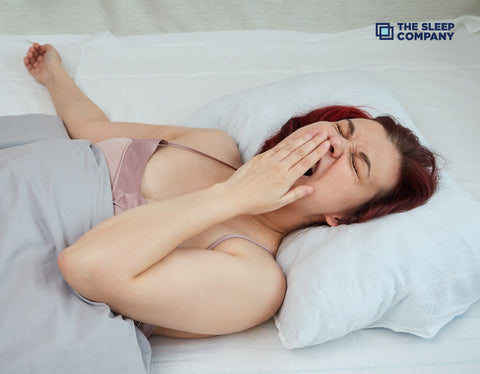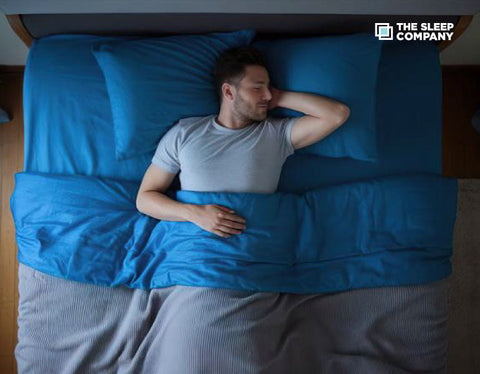My Cart

15 Facts You Need to Know About Sleep Paralysis

Imagine waking up from a deep slumber, opening your eyes, and finding yourself unable to move or talk. It’s sleep paralysis, when a person’s brain is awake but their body is still in a paralyzed sleep condition, this is known as sleep paralysis. It occurs while a person is falling asleep or waking up and is caused by a misalignment of the body and mind. It can be frightening at first, but it’s completely harmless, and most people only get it once or twice in their lives.
What causes Sleep Paralysis?
To understand what causes sleep paralysis, we need to dive into some education regarding sleep phases that occur during sleep -
Sleep Paralysis happens during the deepest period of sleep, REM (rapid eye movement). Our motor neurons are blocked during REM, paralysing the body.
This is done as a safety precaution to prevent the body from acting out the vivid dreams that occur during this stage of sleep. Because most of us are sleeping at this period, we aren’t aware of the paralysis and aren’t bothered by it.
However, when a person has Sleep Paralysis, they are not totally asleep as they are transitioning into or out of slumber, and they are painfully aware that they are unable to move.
It’s unclear what causes sleep paralysis, however, it’s been connected to:
- Sleeping habits were altered due to insomnia – for example, due to shift work or jet lag.
- Post-traumatic stress disorder narcolepsy — a long-term ailment that causes a person to fall asleep suddenly (PTSD)
- Anxiety disorder in general
- A family history of sleep paralysis and panic disorder
What happens during Sleep Paralysis?
The inability to move the body when falling asleep or awakening is the most common sign of sleep paralysis. People may, however, have various symptoms during these periods, such as:
- being unable to talk
- experiencing hallucinations
- Anxiety during the episode
- suffering chest pressure
- trouble breathing, sweating,
- headaches, and muscular discomfort
How can we prevent Sleep Paralysis?
Although there is no particular therapy for sleep paralysis, stress management, a regular sleep schedule, and excellent sleep practices can help to lower the risk of sleep paralysis. The strategies one can opt to improve sleep habits are – going to bed at the same time every night, ensuring a comfortable sleep environment free of distractions, and avoiding caffeine before sleeping.
Facts
- Occurrence: Males and females are affected equally. Between 8% and 50% of people experience sleep paralysis at some point in their life. It usually begins in adolescence and becomes more common in the 20s and 30s. It affects about 7.6% of individuals in their lives, according to Trusted Source.
- Atonia: When you sleep, your brain sends a signal to your body’s voluntary muscles to relax and fall into atonia, which is a condition of paralysis. In your dreams, this limits your physical motions, helping to safeguard your body from external damage. Atonia does not occur correctly in any sleep behavior problem or during nightmares, and the voluntary muscles move while the mind stays asleep, which is why people can do bizarre things in their sleep.
- Parasomnia: Parasomnias are a category of disruptive sleep-related disorders. Sleep Paralysis is one of them.
- Hypnogogic & Hypnopompic: These frightening episodes can occur either as you fall asleep (hypnogogic) or as you wake up (hypnopompic), leaving people unable to move or talk. Episodes might last anything from a few seconds to many minutes. About 5% of people have regular episodes.
- Narcolepsy: If a person has sleep paralysis as a result of narcolepsy or other sleep disorders, a doctor may prescribe medication or psychotherapy to help them control their symptoms.
- Sleep Deprivation: A lack of sleep can make you more likely to have sleep paralysis. It is also more likely that you have a sleep schedule that often changes.
- Anxiety: Although sleep paralysis is rarely life-threatening, it can be distressing. It can occur in conjunction with other sleep disorders like narcolepsy.
- Fear: Part of what makes Sleep Paralysis so frightening is that people are well aware of what is happening to them — and unable to stop it. Despite the fact that this occurrence has been documented for hundreds of years, Sleep paralysis remains a mystery. Various civilizations think that black magic, paranormal powers, or mythological monsters are to blame for the disease.
- Hallucination: Sleep paralysis has been connected to a variety of hallucinations, including the impression that there is an intruder in the room, and the sense of flying. A person may have audio and visual hallucinations during sleep paralysis, which can be quite distressing.
- Mystery: Unfortunately, to date, there have been no systematic trials investigating possible medical treatments for sleep paralysis. Therefore, it still remains a mystery and one can only speculate on the causes.
- Sleep Hygiene: People who develop healthy sleeping habits are the safest therapy for sleep paralysis.
- Waking up: A person will naturally awaken from sleep paralysis. While the event may be alarming at first, it will pass. There is no method to compel a person’s body to move out of a condition of paralysis.
- Overcoming: Understanding the physiology of sleep and the process that causes sleep paralysis is crucial to resolving the condition.
- Cognitive behavioural therapy: Cognitive behavioural therapy may also aid in the development of coping skills for sleep paralysis and the treatment of underlying factors such as insomnia and poor sleeping habits.
- Risk: Isolated sleep paralysis occurs when sleep paralysis occurs as a symptom of another disorder rather than on its own. Nightmares, insomnia, obstructive sleep apnea, as well as mental health illnesses are linked to an
Conclusion
You may help to manage sleep paralysis by diagnosing and treating any underlying issues as well as enhancing your sleep health to guarantee a comfortable, fear-free night’s sleep.


































































